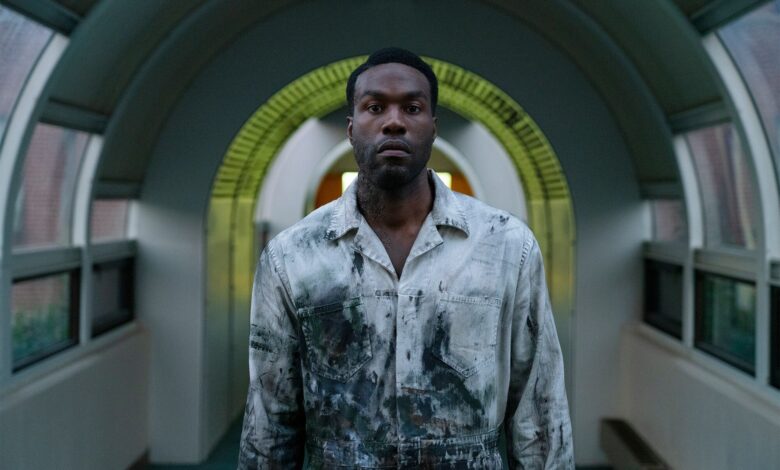A Beginner’s Guide to Black Horror Films

Abby Meacham ‘25 / Emertainment Monthly Staff Writer
If there’s one thing scarier than goblins and ghouls, it’s the systemic racism that affects black Americans in every aspect of their lives. Of course, people don’t go to the movie theater to talk about systemic racism, but throw in some jumpscares and a final girl and audiences will show up in droves, especially black audiences. Hence, we have black horror, which is a subgenre of horror that shifts the focus to black characters, black directors, and black experiences. Some movies dig deep into the effects of racism on black people and use the supernatural as a conduit for that discussion. Others are campy, dramatic, and simply appeal to fans of the classical slasher film who want their serial killers to be more diverse. Before I continue, I’d like to add a caveat to these recommendations: You do not need to be black to enjoy black horror. It seems obvious, but I still think it needs to be said. I by no means represent the opinion of all black cinephiles, but in my book, black horror is at its most impactful when it engages not only those who relate to it but those who don’t. Now, allow me to be your black horror shaman and take you through three films that I consider integral to the black horror experience.
We’re diving right into murky waters with Candyman (2021). The original 1992 movie is a classic, but the 2021 sequel dives even deeper into the social issues presented. For those who don’t know the basic premise, the Candyman is a vengeful spirit with a hook for a hand, who kills anyone who says his name five times in the mirror. Years after the original film takes place, artist Anthony McCoy (Yahya Abdul-Mateen II) develops an obsession with the legend, especially as it begins to influence his art and reveal things about his past. Directed by Nia DaCosta and written by black horror auteur Jordan Peele alongside Win Rosenfeld, this iteration of the Candyman centers the conversation on the cycle of violence perpetrated against black men. In my opinion, that’s where the original falls short. It’s a great movie, but it pulls away from the discussions on racism to focus on the relationship between Helen (Virginia Madsen) and the Candyman (Tony Todd), which is not nearly as important as the message at hand.
Another black horror film I’d recommend is Hulu’s Bad Hair (2020). Set in the 1980s, after the protagonist Anna (Elle Lorraine) gets a new boss at her job at a television station (akin to BET), she and her other black female coworkers are told to get weaves in lieu of wearing their natural hair or risk being fired. But as she begins to rise through the ranks at work, her weave begins to demonstrate supernatural— and maybe even cannibalistic— tendencies.
It’s an interesting movie, to say the least. Not only is it set in the 1980s, but it’s also filmed and edited to appear as though it’s from the 1980s. The camera is grainy and the CGI tastefully atrocious. But it focuses on a part of black social politics that, to many, may not be considered political at all— black hair. At the time of the movie’s release, the C.R.O.W.N. Act, which prevents workplace discrimination based on hairstyle or texture, had only recently been enacted in California, and currently, there are only thirteen states that have similar legislation. Although it might be ridiculous to watch a weave murder people, it is equally as ridiculous that, in the majority of the United States, black women can face termination for wearing their natural hair. As Anna’s former boss Edna (Judith Scott) says, “In a perfect world, a woman would be able to wear her hair the fucking way she wants to.”
My final pick is The Blackening (2022). When a group of black friends get together to spend Juneteenth in a rented cabin, they’re quickly introduced to The Blackening, a malicious board game that forces them to prove their blackness or die trying. Now, if you’ve seen trailers for it (or you’re not black) you’re probably thinking “Abby, I am absolutely not the audience for this movie.” Hear me out. You should watch it anyway.
Unlike the other two films I’ve mentioned, there aren’t any deep conversations being had about systemic racism or violence. In fact, the whole movie is based on a 3Peat sketch that aired on Comedy Central in 2018. But I’m including it because not all black horror needs to be a deep conversation. It stands out next to your Candymans, your Bad Hairs, and your Get Outs because sometimes the black experience is a messy group of friends who take Spades too seriously and agree that the O’Reilly Auto Parts jingle is a certified banger. It’s hilarious, none of your favorite characters will die, and you’ll learn some things about black culture while you’re at it.
There is so much more to black horror than what I’ve described here. You’ll notice that I didn’t recommend any Jordan Peele films, which is not to say that I don’t like Jordan Peele. He’s a great filmmaker, and Get Out has one of the most chilling depictions of liberal racism I’ve ever seen on screen. But with these movies, you’ll be adequately prepared when someone asks you about other black horror movies that you’ve watched. And you’ll have not one, not two, but three answers!
Or you can read the Wikipedia summaries. I promise I won’t tell anyone.